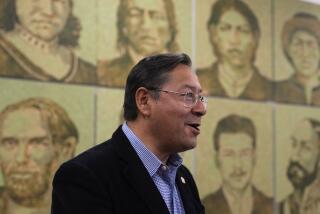Defense Official in Brazil Quits Amid Scandal
- Share via
RIO DE JANEIRO — Brazil’s defense minister has resigned after being engulfed by a public furor that reopened wounds from the country’s past under military rule, officials announced Thursday.
In a letter dated Oct. 22 but made public Thursday, Jose Viegas said he would step down and accept full responsibility for a scandal that exposed the still-simmering tensions between the armed forces and the left-leaning civilian officials now in power, whom the military once hunted as subversives.
The controversy that doomed Viegas’ career stemmed from the publication last month in a Brasilia newspaper of photos purporting to show the humiliation of journalist Vladimir Herzog before he died in custody in 1975. It was one of the most notorious incidents of state-sponsored torture and killing during Brazil’s 1964-85 military dictatorship.
Although Herzog’s widow initially identified her husband as the man in the newly unearthed photos, sitting naked and looking pained, evidence later showed that the subject of at least one photo was not Herzog but an activist priest who was detained by the military.
Still, outrage greeted a statement released by the military that criticized the use of the photos and described the years of official repression as a “legitimate response to the violence of those who refused dialogue and opted for radicalism and illegality, taking the initiative to take up arms and unleash criminal actions.”
The declaration incensed the government, many of whose members -- including President Luiz Inacio Lula da Silva, a former union leader -- were once branded enemies of the state and subjected to arrest, abuse and exile.
Although Brazilians generally treat the dictatorship as ancient history, the military’s unrepentant stance was especially shocking for coming just months after a series of public events marking the 40th anniversary of the coup that brought the generals to power, ceremonies held under the mantra “Never Again.”
The commander of the army, Gen. Francisco Albuquerque, was forced to issue a retraction, saying the military “regretted” Herzog’s death and acknowledging that the original statement after the photos’ publication was not in line with “the current historical moment.” Albuquerque said that he was traveling when the statement was released and that it had not been cleared by his office.
In Viegas’ resignation letter, the defense minister complained that he too had not been consulted before the military’s declaration, which he called “incredible” and worryingly indicative of the “persistence of authoritarian thinking” among some members of the armed forces.
“Now is the time for representatives of this outdated thinking to leave the scene,” Viegas wrote.
He added, however, that he accepted responsibility for the controversy and would step down. Lula’s office said Vice President Jose Alencar would assume Viegas’ duties beginning Monday.
Under Viegas’ tenure, which lasted less than two years, the military began allowing the air force to shoot down planes suspected of smuggling drugs in the airspace over Brazil’s vast rain forest. He also failed to secure pay increases the military had requested.
The furor over the military statement focused attention on the history of antagonism between many government officials and the uniformed officers, who must submit to the democratically elected rulers. One revelation that raised eyebrows during the scandal was that the armed forces continued to monitor left-wing activists, including Lula, into the 1990s.
But since his 2003 inauguration, the president has avoided overt confrontations with the military.
In turn, the armed forces have carried out his government’s orders, such as heading the United Nations peacekeeping force in Haiti.
More to Read
Sign up for Essential California
The most important California stories and recommendations in your inbox every morning.
You may occasionally receive promotional content from the Los Angeles Times.














